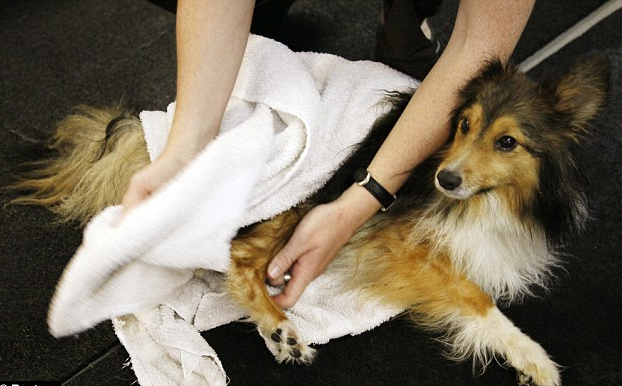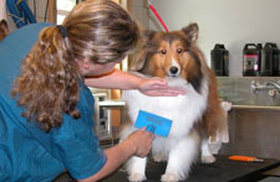Frequently Asked QuestionsIs there a charge for Rescue dogs? Yes - Depending on the situation and whether we have had to pay to get the sheltie released from one of the Shelters. Each case is judged on its merits. What ages are the shelties for adoption? The ages vary considerably. There is no way of knowing what shelties will pass through our hands from time to time and some ages are difficult to ascertain. When a dog is surrendered by its owner, we know the age and a little of its background. What colours are available? Again we have no control over this and we take whatever comes along. We have had the three most popular colours - Sable, Tricolour and Blue Merle. We have even had a mismark which was 75% white and only had one eye - needless to say we named him "Nelson". Do they take much looking after? They leave us in a well groomed condition and we ask new owners to keep the dog in the same condition, or we encourage them to take the dog and have it professionally groomed. The Shetland Sheepdog Club of Victoria has a DVD called "Sheltie Grooming For Novices". If you would like a copy of this DVD click here to email Helen Castles. How can I help? It is sometimes necessary for us to boost our RESCUE funds with raffles or other fund raising efforts. If and when this becomes necessary, any help you can give will be greatly appreciated. We will keep you advised regarding future efforts. WHAT YOU SHOULD KNOW IF YOU ARE THINKING OF ADOPTING A SHELTIE. If you have owned a Sheltie before, then you will know how much grooming is necessary so you can be proud of your dog. Don't let their long coat deter you - they do not need LOTS of grooming, just a good brush through, maybe once a week or even less if the dog is "out of coat" which happens when they lose a fair bit twice a year - more if the dog spends a lot of time in a heated house. |
When they do shed their summer or winter coat, then they need a bit more thorough grooming and if you are unable to do this, then you may need to have the dog professionally groomed.
Of course most shelties love to spend time in the house with the family - they love company and this is when you can develop a good rapport with your dog.
As well as keeping your sheltie looking good, you should be mindful of his or her health, which means feeding a sensible diet - no titbits whenever you think he may like some or
when you are eating, just his or her meal at the appropriate time.
Some people like to feed their dog their main meal in the morning and others feed in the late afternoon or evening. A biscuit when going to bed is always appreciated.
Keeping your dog at an ideal weight is of paramount importance. This will keep him fit and well as overweight dogs are subject to health problems such as arthritis or heart problems
or even diabetes and these will all require Veterinary attention.
It will be your responsibility to get Veterinary attention when necessary, such as for vaccinations etc, and at these times you should have your dog weighed so you can keep check
on him.
You must have good fences and gates which are kept shut. Shelties do not realise the danger of roads - they may run across the road in a flash if something on the other side takes their attention, i.e. another dog or a child.
They should never be outside your property without being on a leash, but they do love to go for a walk with you.
Shelties love children, provided they are supervised and the children are not too boisterous. If the children "stir them up too much" then they may become a little unruly, but
this of course applies to any breed.
They respond very well to training, so you can teach your sheltie to be well-behaved with a little patience and understanding, bearing in mind that he has to learn whatever YOU are teaching, regardless of his previous owners. Some learn quickly, others may take a little longer, but remember - patience and understanding are the key words. He or she will quickly learn where to "go to bed" and after just a very short time, will fall into a bedtime routine.
If and when you take a Rescue Sheltie home, provided you keep these few things in mind, you should have a loving, faithful friend until he reaches an average of thirteen to fourteen years old.
Of course most shelties love to spend time in the house with the family - they love company and this is when you can develop a good rapport with your dog.
As well as keeping your sheltie looking good, you should be mindful of his or her health, which means feeding a sensible diet - no titbits whenever you think he may like some or
when you are eating, just his or her meal at the appropriate time.
Some people like to feed their dog their main meal in the morning and others feed in the late afternoon or evening. A biscuit when going to bed is always appreciated.
Keeping your dog at an ideal weight is of paramount importance. This will keep him fit and well as overweight dogs are subject to health problems such as arthritis or heart problems
or even diabetes and these will all require Veterinary attention.
It will be your responsibility to get Veterinary attention when necessary, such as for vaccinations etc, and at these times you should have your dog weighed so you can keep check
on him.
You must have good fences and gates which are kept shut. Shelties do not realise the danger of roads - they may run across the road in a flash if something on the other side takes their attention, i.e. another dog or a child.
They should never be outside your property without being on a leash, but they do love to go for a walk with you.
Shelties love children, provided they are supervised and the children are not too boisterous. If the children "stir them up too much" then they may become a little unruly, but
this of course applies to any breed.
They respond very well to training, so you can teach your sheltie to be well-behaved with a little patience and understanding, bearing in mind that he has to learn whatever YOU are teaching, regardless of his previous owners. Some learn quickly, others may take a little longer, but remember - patience and understanding are the key words. He or she will quickly learn where to "go to bed" and after just a very short time, will fall into a bedtime routine.
If and when you take a Rescue Sheltie home, provided you keep these few things in mind, you should have a loving, faithful friend until he reaches an average of thirteen to fourteen years old.


